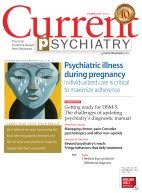Vithyalakshmi Selvaraj, MD, PGY-4 resident, Department of psychiatry, Creighton University, Omaha, NE
Sriram Ramaswamy, MD, Assistant professor, Department of psychiatry, Creighton University, Omaha, NE
Daniel R. Wilson, MD, PhD, Professor and chair of psychiatry, Department of psychiatry, Creighton University, Omaha, NE
Compared with men, women have a 1.3- to 1.8-fold greater risk for developing insomnia. Multiple factors contribute to this increased risk of insomnia, including:
- hormonal changes across the reproductive cycle
- predilection to mood and anxiety disorders
- psychosocial factors, such as being single, separated, or widowed.
Insomnia has tremendous impact on health and quality of life, resulting in reduced work productivity and increased absenteeism, accidents, and health care costs. This article examines the factors that contribute to women’s sleep difficulties throughout the life cycle, and suggests evaluation and treatment approaches appropriate for each phase.
Read full text (free access)
Comment on this article
Email the editor


